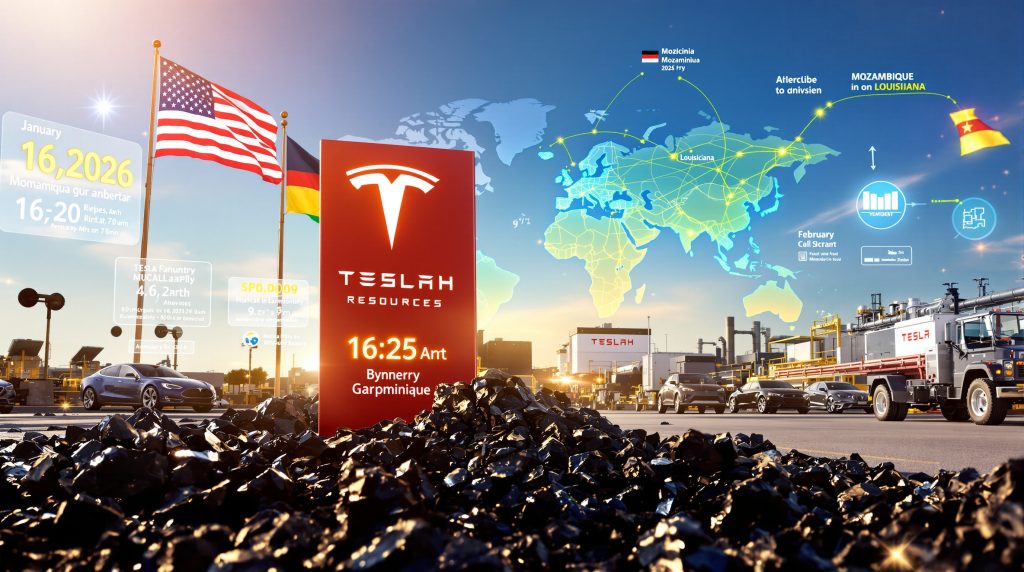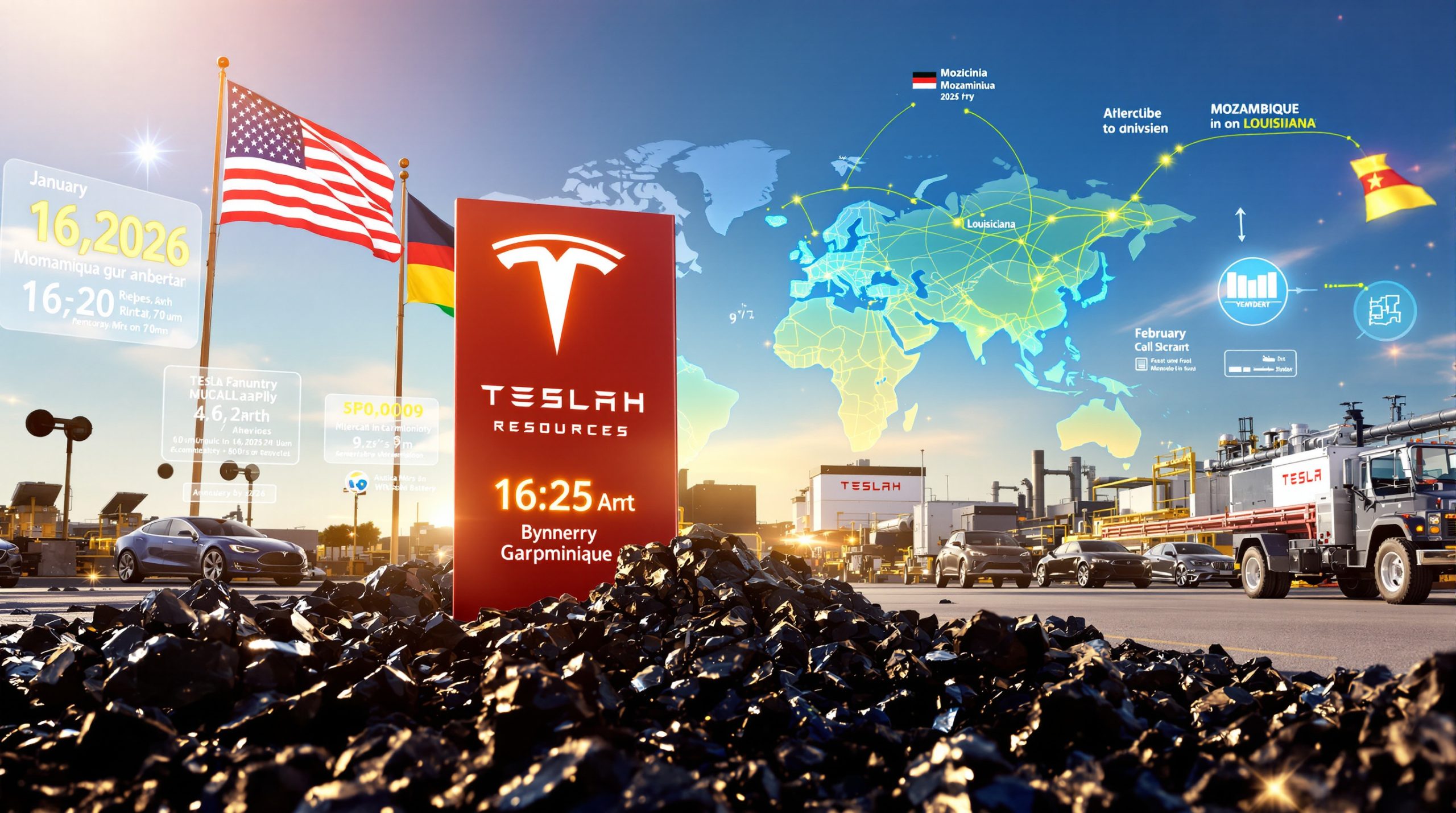Tesla's Graphite Supply Agreement Faces New Challenges as Deadline Extensions Continue
The electric vehicle industry's quest for supply chain independence faces ongoing hurdles as Syrah Resources and Tesla navigate their complex graphite supply partnership. The Australian mining company recently announced its second deadline extension in two months, pushing the material qualification timeline to January 16, 2026, highlighting the technical complexities of establishing domestic battery material production. This Syrah Resources Tesla graphite supply deal extension underscores the broader challenges facing critical minerals energy transition as automakers work to reduce dependence on Chinese-dominated markets.
This development demonstrates the broader challenges facing critical mineral supply chains as automakers work to reduce dependence on Chinese-dominated markets while establishing reliable domestic processing capabilities for electric vehicle batteries.
Understanding the Default Notice and Contractual Timeline Adjustments
Tesla issued a default notice in July 2024 regarding Syrah's alleged failure to deliver conforming active anode material samples from its Louisiana processing facility. The original September 16, 2024 cure date has now been extended twice, first to November 15, 2024, and subsequently to January 16, 2026.
Despite these extensions, Syrah maintains its position that it has not defaulted on the agreement terms. The company stated that while it does not accept being in default under the offtake agreement, both parties agreed to extend the cure date to provide additional time for material qualification.
The technical requirements center on delivering battery-grade active anode material that meets Tesla's specific conformance standards for electric vehicle battery integration. This involves transforming natural graphite from Syrah's Mozambique operations into processed material suitable for lithium-ion battery anodes at the Vidalia facility in Louisiana.
Critical Milestones and Final Qualification Requirements
The contractual framework establishes February 9, 2026 as the ultimate termination trigger date for Tesla. If final qualification of the plant's active anode material is not achieved by this date, Tesla retains the right to terminate the entire offtake agreement.
This creates a narrow window of approximately 24 days between the extended cure date and potential contract termination, indicating limited flexibility for further negotiations if qualification targets are not met. The material testing standards required for electric vehicle battery integration involve complex quality control benchmarks that must demonstrate consistent performance characteristics.
Strategic Importance of Domestic Graphite Supply Development
The partnership between Syrah Resources and Tesla represents a significant strategic initiative to establish domestic battery material production capacity. The 2021 contract commits to supplying 8,000 metric tons of graphite anode materials over a four-year period, translating to approximately 2,000 metric tons annually.
Breaking China's Market Dominance in Battery Materials
Syrah's Vidalia facility holds unique strategic value as the only vertically integrated, large-scale anode material producer outside China. This positioning directly addresses the challenge of Chinese supplies that dominate the global graphite anode market, creating supply chain vulnerabilities for Western electric vehicle manufacturers.
The facility's vertical integration means it combines both raw graphite processing and active anode material production in a single location, providing operational advantages over multi-stage processing arrangements that span different geographic regions. This integration model reduces logistical complexity and provides greater quality control throughout the production process.
Tesla's Multi-Sourcing Approach to Critical Components
Tesla's engagement with Syrah reflects a broader strategy to diversify critical battery component sourcing beyond traditional Chinese suppliers. This approach serves multiple objectives:
- Risk mitigation through geographic distribution of suppliers
- Supply chain transparency and quality control advantages
- Long-term battery cost reduction through competitive sourcing
- Alignment with U.S. policy objectives for domestic manufacturing
The partnership also demonstrates Tesla's commitment to supporting the development of domestic critical mineral processing infrastructure, even when technical qualification timelines extend beyond initial projections. Furthermore, companies are increasingly looking toward innovative solutions like the recent battery recycling breakthrough to enhance sustainability across the battery supply chain.
Technical Challenges in Natural Graphite Processing Operations
The transformation from raw graphite to battery-grade anode material involves complex processing requirements that present significant technical hurdles. Syrah must convert natural graphite extracted from its Balama operations in Mozambique into conforming active anode material that meets Tesla's lithium-ion battery specifications.
Complex Processing Requirements for Battery Integration
Active anode material production requires precise control of particle size distribution, surface chemistry, and electrochemical properties. The material must demonstrate consistent performance characteristics including:
- Stable capacity retention over charge-discharge cycles
- Appropriate electrical conductivity for lithium-ion insertion
- Chemical purity standards for battery safety requirements
- Structural integrity under operational stress conditions
The repeated deadline extensions suggest these technical specifications are more challenging to achieve consistently at commercial scale than initially anticipated. Quality specifications for lithium-ion battery applications involve stringent testing protocols that verify material performance under various operational conditions.
Geographic Integration Challenges Across Continents
Syrah manages a geographically distributed operation that spans Mozambique mining operations and Louisiana processing facilities. This arrangement requires reliable logistics coordination and quality control across international boundaries, creating additional complexity compared to single-region operations.
The integration between Balama graphite extraction and Vidalia processing involves maintaining material consistency throughout the supply chain, from raw ore extraction through final anode material production. Transportation logistics, quality preservation during shipping, and coordination between facilities on different continents add operational risk factors.
Impact of Operational Disruptions on Supply Chain Reliability
Recent operational challenges have demonstrated the vulnerability of geographically distributed critical mineral supply chains to political and economic instability. Syrah's operations faced significant disruptions in 2024 due to nationwide protests in Mozambique, affecting the Balama graphite extraction facility.
Mozambique Political Instability and Mining Operations
The Balama facility experienced operational disruptions during 2024 nationwide protests in Mozambique, highlighting the political risk factors associated with African mining operations. These disruptions affected raw material supply to the Louisiana processing facility, creating additional challenges for meeting Tesla's material qualification timeline.
To address these operational challenges, Syrah received $8.5 million under its United States International Development Finance Corporation loan facility in November 2024. This disbursement represents partial access to a total $150 million commitment designed to support operational stability at the Balama operations.
Financial Support Mechanisms and Strategic Importance
The U.S. International Development Finance Corporation's $150 million loan commitment reflects institutional recognition of the strategic importance of Balama operations to U.S. battery supply chain resilience. This government backing demonstrates policy-level support for establishing alternative sources of critical battery materials.
The DFC financing serves multiple purposes:
- Providing working capital for sustained mining operations
- Supporting operational improvements and expansion capabilities
- Demonstrating U.S. government commitment to supply chain diversification
- Creating financial incentives for continued Mozambique operations despite political risks
Consequently, this financial support aligns with broader initiatives such as Australia's critical minerals strategic reserve to ensure supply chain security.
Market Implications of Repeated Timeline Extensions
The pattern of deadline extensions creates market uncertainty regarding both Tesla's battery supply planning and Syrah's operational execution capabilities. The progression from September 2024 to January 2026 represents a timeline extension of approximately 16 months beyond the original cure date.
Electric Vehicle Industry Supply Chain Planning
Tesla's battery production planning must account for potential delays or termination of the Syrah supply agreement. If the January 16, 2026 deadline is missed, Tesla faces the loss of a committed 2,000 metric tons annually from its graphite anode material supply planning by February 9, 2026.
This scenario would require Tesla to secure alternative graphite anode sourcing, potentially from Chinese suppliers that the partnership was designed to replace. Alternative sourcing options may involve different technical specifications, pricing structures, or supply chain risk profiles that affect overall battery production costs.
Investor Sentiment and Operational Execution Concerns
The repeated extensions signal to investors that establishing large-scale critical mineral processing facilities involves longer development timelines than initially projected. This pattern may affect investor confidence in similar domestic battery material development projects across the industry.
Market participants are likely monitoring several key factors:
- Technical progress indicators from the Vidalia facility
- Financial performance of both Balama and Louisiana operations
- Alternative partnership opportunities for both companies
- Broader industry timeline expectations for new facility qualification
Broader Context for U.S. Battery Manufacturing Independence
The Tesla-Syrah partnership represents part of a larger strategic initiative to establish domestic battery material production capabilities that reduce dependence on Chinese-controlled supply chains. This effort aligns with broader U.S. policy objectives for critical mineral supply security.
Domestic Critical Mineral Processing Development
The Vidalia facility's role as the only vertically integrated, large-scale anode material producer outside China positions it as a critical component of U.S. battery manufacturing infrastructure. Successful qualification would demonstrate the viability of establishing domestic processing capabilities for critical battery materials.
Government policy support through mechanisms like the DFC financing creates favourable conditions for domestic critical mineral development. This support reflects recognition that battery material supply chain independence requires patient capital investment and technical development timelines that exceed typical commercial project horizons.
For instance, similar initiatives in other regions include India's development of a battery-grade lithium refinery to support regional battery production capabilities.
Competitive Positioning in Global Battery Materials
The success or failure of the Tesla-Syrah partnership will influence future domestic battery material development initiatives. Successful qualification would validate the technical and economic viability of establishing U.S.-based anode material production, potentially encouraging additional investment in similar facilities.
Conversely, contract termination would highlight the challenges of competing with established Chinese battery material suppliers and may discourage similar domestic development projects. The outcome carries implications beyond the specific partnership for broader U.S. battery manufacturing competitiveness.
Key Performance Indicators Through Final Deadline
Industry observers and investors should monitor several critical performance indicators leading up to the January 16, 2026 deadline and potential February 9, 2026 termination trigger.
Material Qualification Progress Metrics
The most critical factor is Syrah's progress in achieving Tesla's material qualification requirements. This involves demonstrating that active anode material from the Vidalia facility consistently meets performance specifications for Tesla's lithium-ion battery applications.
Key technical milestones include:
- Successful completion of material conformance testing
- Demonstration of consistent production quality at target volumes
- Integration testing with Tesla's battery manufacturing processes
- Long-term performance validation under operational conditions
Financial and Operational Stability Indicators
Syrah's financial performance and operational stability at both Balama and Vidalia facilities will influence its ability to meet qualification requirements. The company's utilisation of the $150 million DFC loan facility and progress in addressing 2024 operational disruptions provide important context for operational execution capabilities.
Production volume consistency metrics will demonstrate whether the Vidalia facility can reliably produce 2,000 metric tons annually of qualified material. This involves both technical capability validation and operational process optimisation.
Strategic Lessons for Critical Mineral Supply Chain Development
The Tesla-Syrah partnership provides valuable insights into the complexities of establishing domestic critical mineral processing capabilities. The extended qualification timeline demonstrates that developing large-scale battery material production involves technical challenges that exceed initial planning assumptions.
Realistic Timeline Planning for New Facility Development
The progression from a 2021 contract initiation to 2024-2026 qualification extensions illustrates the time required to establish and qualify new critical mineral processing facilities. This timeline reality should inform future project planning for similar domestic battery material development initiatives.
Patient capital investment, such as the $150 million DFC commitment, appears necessary to support the extended development timelines required for critical mineral processing facility qualification. Commercial financing alone may not provide sufficient flexibility for the technical development requirements involved.
Moreover, the mining industry is witnessing transformative changes as EV mining transformation initiatives reshape traditional operations and create new efficiency opportunities.
Risk Management for Geographically Distributed Operations
The 2024 Mozambique disruptions highlight the importance of political risk assessment and mitigation strategies for critical mineral supply chains that span multiple continents. Geographic diversification provides supply security benefits but requires robust risk management frameworks.
Successful management of distributed operations requires coordination capabilities, quality control systems, and financial resources that support operations across different regulatory and political environments.
Long-Term Outlook for Domestic Battery Material Production
The Tesla-Syrah partnership outcome will influence future domestic battery material development strategies regardless of whether final qualification is achieved by the January 16, 2026 deadline.
Potential for Expanded Collaboration Beyond Current Agreement
Successful qualification could create opportunities for expanded collaboration between Tesla and Syrah beyond the current 8,000 metric ton commitment. Tesla's growing battery production requirements may support additional volume commitments if the Vidalia facility demonstrates reliable production capabilities.
Expanded partnerships could involve technology sharing, additional processing capacity development, or integration of other battery material processing capabilities at the Louisiana facility.
Contribution to U.S. Battery Supply Chain Security
The partnership represents a foundational initiative for establishing U.S. battery material supply chain independence. Success would validate the technical and economic viability of domestic anode material production, potentially encouraging additional investment in similar facilities.
The broader contribution to global electric vehicle adoption acceleration depends on establishing reliable, cost-competitive domestic battery material production that reduces dependence on geopolitically concentrated supply sources. However, recent market developments indicate the ongoing challenges faced by companies attempting to establish alternative supply chains.
What Does the Future Hold for This Partnership?
As we approach the critical January 16, 2026 deadline, the Syrah Resources Tesla graphite supply deal extension continues to represent more than just a bilateral commercial agreement. It symbolises the broader challenges and opportunities in establishing resilient, domestic critical mineral supply chains.
The success of this partnership could serve as a blueprint for future collaborations, while its potential failure would provide valuable lessons about the complexities of competing with established Chinese suppliers. Furthermore, the extended timelines reflect the reality that building new critical mineral processing capabilities requires patience, substantial investment, and technical expertise that cannot be rushed.
The outcome will undoubtedly influence policy decisions, investor confidence, and strategic planning across the entire electric vehicle and battery manufacturing ecosystem. As the Syrah Resources Tesla graphite supply deal extension progresses toward its final resolution, industry stakeholders continue to watch closely for indicators of success or failure that will shape the future of domestic battery material production.
Disclaimer: This analysis is based on publicly available information and involves forward-looking assessments that carry inherent uncertainty. Material qualification timelines, operational performance, and market developments may differ from current projections. Investors should conduct independent research and consider multiple factors before making investment decisions.
Ready to Discover Profitable Critical Mineral Investments?
Discovery Alert's proprietary Discovery IQ model delivers real-time notifications on significant ASX mineral discoveries, instantly empowering subscribers to identify actionable opportunities in critical minerals like graphite and lithium ahead of the broader market. Understand why major mineral discoveries can lead to substantial market returns by exploring Discovery Alert's dedicated discoveries page, showcasing historic examples of exceptional outcomes, and begin your 30-day free trial today to position yourself ahead of the market.




